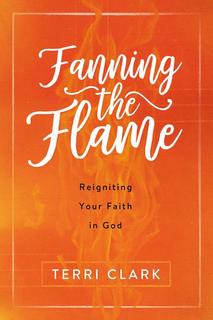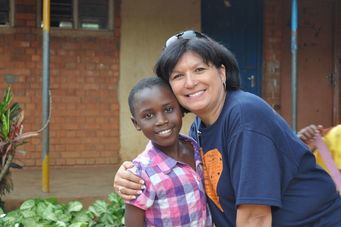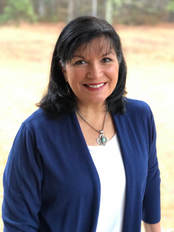Q&A with Terri Clark
Author of "Fanning the Flame: Reigniting your faith in God"

Q: What inspired you to write “Fanning the Flame”?
A: I felt like I was a candle being burnt at both ends. I was still speaking and traveling overseas for the ministry, but my own spiritual flame was not what it used to be. I went to minister in an Asian nation where they were closed to the Gospel. I thought it would be great to talk to those women who had given up so much to minister to others so that I might be encouraged. What I found was that they were getting burnt out as well. I thought if it can happen to these women who are warriors for the Gospel, it can certainly happen to me. So I decided I needed to find out what obstacles had started blocking my own faith and my relationship with God.
Q: You went to great lengths to learn about lamps in biblical times. What did you learn by doing that?
A: I am a visual learner and when God kept bringing scriptures to me about lamps, I became curious as to what those looked like when the verses were written. I learned that the lamps in that time period were made out of clay and they were shaped like small bowels that fit in the palm of your hand. So I went to the store, got some clay, baked it and made one for myself. I put a piece of terry cloth in it as the wick, added some olive oil, and it actually worked! But I noticed it would burn out quickly until I trimmed the wick, then it would burn bright again, just as the scripture suggests. God taught me some important lessons through that exercise. We are the clay formed by the potter, shaped for a purpose — to bring light. But we need the oil (the Holy Spirit) and faith (the wick) in order to do that. And we need to trim that faith (wick) often in order to get rid of the black, burned out things in our lives that keep us from being a bright, glowing light.
Q: What do you think are the biggest contributing factors to people losing their faith?
A: Our society today is so fast-paced. From our food to our information, we want everything instantaneously. People today are so busy that God becomes just another thing on their to-do list. We simply don’t take the time to read the Bible or pray and listen to what God is saying to us. We are not pursuing Him like we should. When He takes a back seat in our lives, we put other things in His place, usually ourselves. We are also a very distracted society. In our home, we have a rule —no phones or electronic devices when we eat together. I watched a family at a restaurant one time. Everyone had a phone, but a little 8 or 9 year old boy. They were all busy on their devices and no one acknowledged this boy. He was sitting at a table full of people, yet he was all alone. I think that’s how God must see us sometimes. We are so occupied with our social worlds, talking to anyone who will listen to our needs, our dreams, our wants, but we never look up to see that Jesus is right there waiting, waiting for us to engage Him in conversation about those things. We need to put down our smart phones and talk to the One who really can make a difference in our lives.
A: I felt like I was a candle being burnt at both ends. I was still speaking and traveling overseas for the ministry, but my own spiritual flame was not what it used to be. I went to minister in an Asian nation where they were closed to the Gospel. I thought it would be great to talk to those women who had given up so much to minister to others so that I might be encouraged. What I found was that they were getting burnt out as well. I thought if it can happen to these women who are warriors for the Gospel, it can certainly happen to me. So I decided I needed to find out what obstacles had started blocking my own faith and my relationship with God.
Q: You went to great lengths to learn about lamps in biblical times. What did you learn by doing that?
A: I am a visual learner and when God kept bringing scriptures to me about lamps, I became curious as to what those looked like when the verses were written. I learned that the lamps in that time period were made out of clay and they were shaped like small bowels that fit in the palm of your hand. So I went to the store, got some clay, baked it and made one for myself. I put a piece of terry cloth in it as the wick, added some olive oil, and it actually worked! But I noticed it would burn out quickly until I trimmed the wick, then it would burn bright again, just as the scripture suggests. God taught me some important lessons through that exercise. We are the clay formed by the potter, shaped for a purpose — to bring light. But we need the oil (the Holy Spirit) and faith (the wick) in order to do that. And we need to trim that faith (wick) often in order to get rid of the black, burned out things in our lives that keep us from being a bright, glowing light.
Q: What do you think are the biggest contributing factors to people losing their faith?
A: Our society today is so fast-paced. From our food to our information, we want everything instantaneously. People today are so busy that God becomes just another thing on their to-do list. We simply don’t take the time to read the Bible or pray and listen to what God is saying to us. We are not pursuing Him like we should. When He takes a back seat in our lives, we put other things in His place, usually ourselves. We are also a very distracted society. In our home, we have a rule —no phones or electronic devices when we eat together. I watched a family at a restaurant one time. Everyone had a phone, but a little 8 or 9 year old boy. They were all busy on their devices and no one acknowledged this boy. He was sitting at a table full of people, yet he was all alone. I think that’s how God must see us sometimes. We are so occupied with our social worlds, talking to anyone who will listen to our needs, our dreams, our wants, but we never look up to see that Jesus is right there waiting, waiting for us to engage Him in conversation about those things. We need to put down our smart phones and talk to the One who really can make a difference in our lives.

: You draw a parallel in the book between the three required Jewish feasts that are in the Old Testament and a Christian’s faith journey. Talk about that.
A: Our spiritual journey can be compared to the pilgrimage God instructed His people to take three times each year. The first was the festival of Passover, celebrating the Israelites delivery from bondage in Egypt. The second was Shavuot, the Feast of Weeks, remembering the giving of the Torah (God’s Word) exactly seven weeks after the Exodus and Passover. It is also known as Pentecost. The third festival was Sukkot, which celebrates the wandering of the Israelites in the desert for forty years, when they had to rely only upon God for direction, sustenance, and protection. It seems to me those three feasts correlate with a Christian believer’s walk with God. Passover—returning to our first love and remembering our salvation by the precious shed blood of our Savior, Jesus Christ. Pentecost—resolving to wait on and trust in the power of the Holy Spirit, who quickens his Word and enables us to become witnesses to Jesus Christ, guiding us into all truth wherever we go or whomever we meet in the world. And Sukkot—the feast that follows repentance, returning to a total dependence on God for strength, wisdom, guidance, and sustenance—a restored fellowship and faith in our God.
Q: Talk about your ministry in Uganda and how that got started.
A: Honestly, being a missionary was about the furthest thing from my mind. But a lady from Uganda came to our bible study here in our town, and we kept in touch for a long time. She kept begging me to come to her country, and when I finally did, I fell in love with the people. Today, we have helped build a three-story hospital facility called Ray of Hope, and have created a child education sponsorship program for the children of Uganda, with over 500 children enrolled to date. We also take humanitarian teams each year to the country.
Q: Talk about your marriage and family ministry.
A: Nearly 30 years ago, my husband and I became a real-life Brady Bunch, as he brought three kids into the marriage and I brought three kids. We learned a lot about the ups and downs of being a blended family, and that’s what inspired my first book, ‘Tying the Family Knot: Meeting the Challenges of a Blended Family’. At that time, there were not a lot of helpful resources for Christians on this subject, and we have been able to hold conferences, seminars and teachings to help people deal with all the emotional issues that come with raising someone else’s kids. I talk about some of the practical things we did such as developing new family holiday traditions, setting standards, and giving each child a feeling of belonging, stability, and love. Blended families have specific challenges, and I teach on how to deal with power struggles, choosing battles, organization, and dealing with ex-spouses. We have seen God redeem and strengthen so many families over the years, and that has been very rewarding.
Q: What do you hope readers gain from “Fanning the Flame”?
A: I had one lady who read an early copy of the book tell me that she had struggled with her faith for the past 14 years, but this book helped her get back on track. That is exactly what I hope will happen for everyone who reads it. I get very vulnerable in the book and share my own battles with the obstacles that blocked my pursuit of God. The main thing I want them to gain is a renewed sense of God’s presence in their lives.
A: Our spiritual journey can be compared to the pilgrimage God instructed His people to take three times each year. The first was the festival of Passover, celebrating the Israelites delivery from bondage in Egypt. The second was Shavuot, the Feast of Weeks, remembering the giving of the Torah (God’s Word) exactly seven weeks after the Exodus and Passover. It is also known as Pentecost. The third festival was Sukkot, which celebrates the wandering of the Israelites in the desert for forty years, when they had to rely only upon God for direction, sustenance, and protection. It seems to me those three feasts correlate with a Christian believer’s walk with God. Passover—returning to our first love and remembering our salvation by the precious shed blood of our Savior, Jesus Christ. Pentecost—resolving to wait on and trust in the power of the Holy Spirit, who quickens his Word and enables us to become witnesses to Jesus Christ, guiding us into all truth wherever we go or whomever we meet in the world. And Sukkot—the feast that follows repentance, returning to a total dependence on God for strength, wisdom, guidance, and sustenance—a restored fellowship and faith in our God.
Q: Talk about your ministry in Uganda and how that got started.
A: Honestly, being a missionary was about the furthest thing from my mind. But a lady from Uganda came to our bible study here in our town, and we kept in touch for a long time. She kept begging me to come to her country, and when I finally did, I fell in love with the people. Today, we have helped build a three-story hospital facility called Ray of Hope, and have created a child education sponsorship program for the children of Uganda, with over 500 children enrolled to date. We also take humanitarian teams each year to the country.
Q: Talk about your marriage and family ministry.
A: Nearly 30 years ago, my husband and I became a real-life Brady Bunch, as he brought three kids into the marriage and I brought three kids. We learned a lot about the ups and downs of being a blended family, and that’s what inspired my first book, ‘Tying the Family Knot: Meeting the Challenges of a Blended Family’. At that time, there were not a lot of helpful resources for Christians on this subject, and we have been able to hold conferences, seminars and teachings to help people deal with all the emotional issues that come with raising someone else’s kids. I talk about some of the practical things we did such as developing new family holiday traditions, setting standards, and giving each child a feeling of belonging, stability, and love. Blended families have specific challenges, and I teach on how to deal with power struggles, choosing battles, organization, and dealing with ex-spouses. We have seen God redeem and strengthen so many families over the years, and that has been very rewarding.
Q: What do you hope readers gain from “Fanning the Flame”?
A: I had one lady who read an early copy of the book tell me that she had struggled with her faith for the past 14 years, but this book helped her get back on track. That is exactly what I hope will happen for everyone who reads it. I get very vulnerable in the book and share my own battles with the obstacles that blocked my pursuit of God. The main thing I want them to gain is a renewed sense of God’s presence in their lives.
About Terri Clark:

As President and Founder of Terri Clark Ministries, Inc., a 501(c)3 non-profit organization, Terri Clark has an on-going outreach in Uganda where her ministry helped build the Ray of Hope Medical Center and establish a Child Education Sponsorship Program that has served over 500 children. Her international outreaches have included Mexico, India, Vietnam, China and Myanmar. She authored the book “Tying the Family Knot: Meeting the Challenges of a Blended Family” and is an AACC Biblical Counselor and Christian Life Coach. Her articles have appeared in magazines such as Focus on the Family’s Thriving Family Magazine, Lifeway’s Home Life, Parent Life and Parenting Teens magazines, as well as Crosswalk.com and CBN.com. She and her husband, Harvey, enjoy life together, especially while riding their Spyder motorcycles. For more information, visit www.terriclarkministries.org.